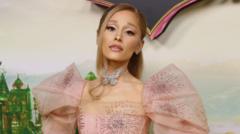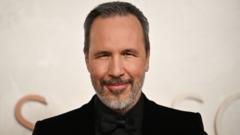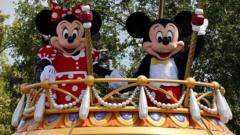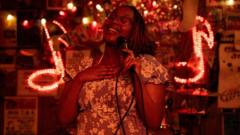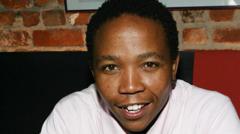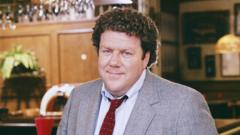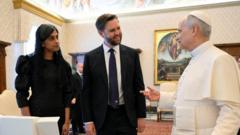The film portrays the intense and secretive nature of the conclave, revealing the intricate dynamics at play among cardinals as they navigate the election of a new pope.
**Exploring the Papal Conclave: Insights from the Film Conclave Amidst Upcoming Election**
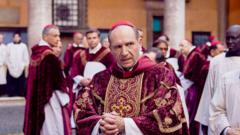
**Exploring the Papal Conclave: Insights from the Film Conclave Amidst Upcoming Election**
In "Conclave," the recent film adaptation delves into the complexities of the papal election process, providing a dramatic backdrop as the Catholic Church prepares for its next leader.
In the film "Conclave," which has garnered significant attention and accolades, viewers descend into the enigmatic world of the Vatican, showcasing the intricacies surrounding the selection of a new pope. As real-life events unfold with the commencement of the papal conclave on May 7, when 134 cardinals will convene in secrecy within the iconic Sistine Chapel, the film's narrative draws parallels to the authentic experiences these cardinal-electors encounter.
Based on Robert Harris's best-selling novel, the film demonstrates the cloistered environment in which cardinals find themselves—isolated from the outside world and each other, underscoring a tradition steeped in centuries of history. This isolation aims to mitigate any external influences during the election, although practical needs still connect them physically to the outside world. Stephen Bullivant, a professor of theology, notes that the film encapsulates this "intense responsibility," creating an atmosphere of complete introspection where decisions that could alter the future of the Catholic Church are made.
Within the film's narrative lies an intricate depiction of the political maneuvering characteristic of conclave proceedings. As cardinals vie for recognition and strategize potential alliances, tensions rise, reflecting both their divine obligations and personal aspirations. Tina Beattie, a scholar of Catholic studies, points out the likelihood of pre-conclave politicking influenced by Pope Francis's declining health, emphasizing that true drama often manifests in private discussions well before ballots are cast.
While "Conclave" introduces characters who may not typically have a say in this sacred process, current realities dictate that only cardinals designated by prior popes hold voting rights. Notably, the impending election introduces a new dynamic, as 80% of the cardinal electorate was appointed by Pope Francis over the past decade, representing a shift toward more diverse yet unpredictable affiliations. This diversity may cloud consensus, suggesting an unprecedented clash of ideologies and priorities.
Director Edward Berger’s approach sheds light on the human side of these theological leaders. Portrayed as layered individuals grappling with their ambitions and vulnerabilities, the film strips away the glorified image of cardinals, mapping relatable human experiences such as ambition, fear, and temptation onto these spiritual figures. Professor Anna Rowlands contemplates the blend of divine purpose and human emotion epitomized in the conclave, reminding us that the election of a pope, albeit a spiritual act, is layered with human complexities.
As the real conclave approaches, "Conclave" invites audiences to ponder the nuances of this pivotal ritual, offering a cinematic glimpse into one of the most politically and spiritually charged processes within the Roman Catholic Church.
Based on Robert Harris's best-selling novel, the film demonstrates the cloistered environment in which cardinals find themselves—isolated from the outside world and each other, underscoring a tradition steeped in centuries of history. This isolation aims to mitigate any external influences during the election, although practical needs still connect them physically to the outside world. Stephen Bullivant, a professor of theology, notes that the film encapsulates this "intense responsibility," creating an atmosphere of complete introspection where decisions that could alter the future of the Catholic Church are made.
Within the film's narrative lies an intricate depiction of the political maneuvering characteristic of conclave proceedings. As cardinals vie for recognition and strategize potential alliances, tensions rise, reflecting both their divine obligations and personal aspirations. Tina Beattie, a scholar of Catholic studies, points out the likelihood of pre-conclave politicking influenced by Pope Francis's declining health, emphasizing that true drama often manifests in private discussions well before ballots are cast.
While "Conclave" introduces characters who may not typically have a say in this sacred process, current realities dictate that only cardinals designated by prior popes hold voting rights. Notably, the impending election introduces a new dynamic, as 80% of the cardinal electorate was appointed by Pope Francis over the past decade, representing a shift toward more diverse yet unpredictable affiliations. This diversity may cloud consensus, suggesting an unprecedented clash of ideologies and priorities.
Director Edward Berger’s approach sheds light on the human side of these theological leaders. Portrayed as layered individuals grappling with their ambitions and vulnerabilities, the film strips away the glorified image of cardinals, mapping relatable human experiences such as ambition, fear, and temptation onto these spiritual figures. Professor Anna Rowlands contemplates the blend of divine purpose and human emotion epitomized in the conclave, reminding us that the election of a pope, albeit a spiritual act, is layered with human complexities.
As the real conclave approaches, "Conclave" invites audiences to ponder the nuances of this pivotal ritual, offering a cinematic glimpse into one of the most politically and spiritually charged processes within the Roman Catholic Church.

